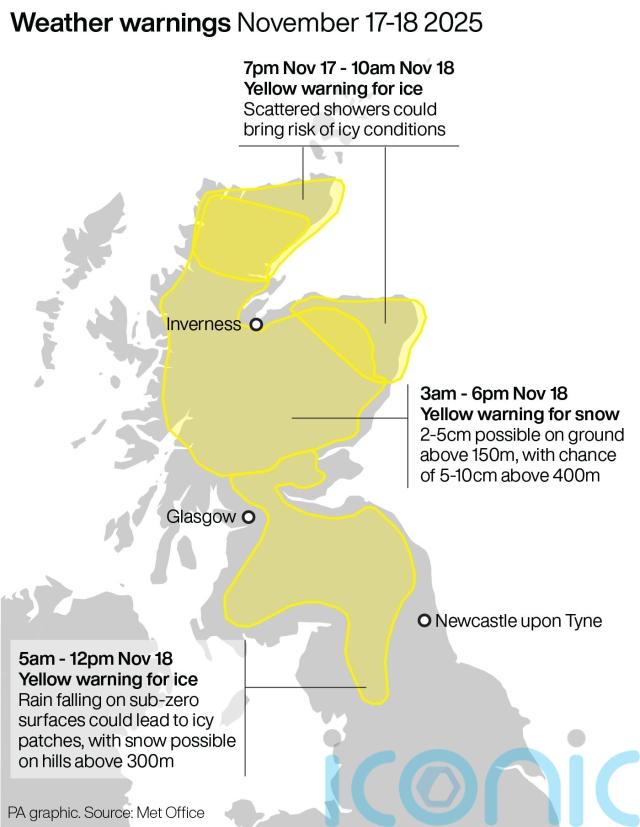
An amber cold health alert has been issued by the UK Health Security Agency for parts of England as the Met Office warned overnight temperatures could drop to as low as minus 10C this week.
The amber alert is in place for the North East, North West and Yorkshire and the Humber, while a yellow alert is in place for the rest of England between 12pm on Monday until 8am on Saturday.
It means the weather is likely to cause “significant impacts across health and social care services” including an increase in demand for health services, temperatures inside places like hospitals, care homes and clinics dropping below the levels recommended for assessing health risks and a rise in deaths, particularly among those aged 65 and over or with health conditions.
It comes as the Met Office issued multiple yellow weather warnings for snow and ice affecting parts of Scotland and northern England from Monday to Thursday, with sub-zero temperatures expected during the first cold snap of the year.
Chief forecaster Paul Gundersen said: “Scattered showers feed into the North East and far north of mainland Scotland on Monday night, bringing a risk of icy conditions on roads and pavements.

“An area of rain will reach the west of Scotland early on Tuesday morning, with a risk of this turning to snow as it moves inland.
“Whilst there is some uncertainty as to the exact track and extent, a period of snow is likely over high ground, with accumulations of 2-5cm possible above about 150 metres in elevation, and as much as 5-10cm above 400 metres.
“This period of snow could bring some disruption to travel and infrastructure across higher parts of Scotland.”
By Wednesday, a “strong and very cold northerly flow” will make temperatures feel even colder.
Deputy chief forecaster Tom Crabtree said: “Wednesday to Friday will be the coldest part of the week, and this period has the greatest potential for impactful weather, with multiple warnings in place.
⚠️ Yellow weather warning issued ⚠️
Snow and ice across northern and central parts of Scotland
Tuesday 1800 – Thursday 2100
Latest info 👉 https://t.co/QwDLMfRBfs
Stay #WeatherAware⚠️ pic.twitter.com/h5YOToJ36B
— Met Office (@metoffice) November 17, 2025
“Overnight, temperatures could get down to minus 10C, with a significant wind chill from the strong northerly wind making things feel even colder.
“Wintry snow showers are expected to extend south through Wednesday and into Thursday, mainly affecting north facing coastal areas.
“Snow accumulations are possible, including 2-5cm to some low-lying areas in the north and east where showers are frequent.
“On hills in parts of Northern Ireland, the northeast of England and Scotland, 5-10cm of snow could fall and accumulations of 15-20cm are possible above 300 metres in parts of north-eastern England and Scotland.
“Although many places will see plenty of sunshine, daytime temperatures will be well-below average, with a widespread frost setting in during the evening, especially in sheltered areas.
“With sub-zero temperatures in the first ‘cold snap’ of the year, updates to the current warnings are possible, so it’s important people keep up to date with the forecast.”
Conditions are turning colder this week, with multiple snow and ice warnings in place 🧊
Wednesday to Friday will be the coldest part of the week, and this period has the greatest potential for impactful weather.
Find out more ⤵️
— Met Office (@metoffice) November 17, 2025
Conditions are expected to be drier from Friday, with temperatures feeling milder and rain reaching the west later in the day.
With temperatures set to plummet across UK this week, the British Heart Foundation (BHF) is warning people with heart conditions of the potential dangers posed by the cold weather.
Ruth Goss, senior cardiac nurse at the British Heart Foundation, said: “Cold temperatures can increase the risk of heart attacks and strokes, and people with cardiovascular disease are also more at risk of serious illness if they get seasonal respiratory infections like flu.
“It’s especially important that people living with heart conditions are well prepared for the cold snap this winter by wrapping up warm and having their free flu jab.”
BHF tips include keeping indoor temperatures to at least 18 degrees, layering up with socks, jumpers and blankets to trap in heat, staying active indoors and eating warming meals and healthy hot drinks and wearing a scarf loosely around your mouth and nose to breathe in warmer air if you have angina.
Subscribe or register today to discover more from DonegalLive.ie
Buy the e-paper of the Donegal Democrat, Donegal People's Press, Donegal Post and Inish Times here for instant access to Donegal's premier news titles.
Keep up with the latest news from Donegal with our daily newsletter featuring the most important stories of the day delivered to your inbox every evening at 5pm.